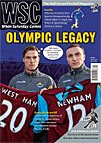 Niall Quinn has criticised supporters for illegally watching their teams play on televsion rather than in the stands
Niall Quinn has criticised supporters for illegally watching their teams play on televsion rather than in the stands
Sunderland chairman Niall Quinn said that his claim to “despise” fans who watch matches in pubs was meant to start a debate on falling attendances. But, while every detail of Arsenal against Barcelona was minutely scrutinised, Quinn’s comments received minimal press coverage.
Brian McNally in the Mirror did bring up the broader issues with the modern game, referring to the “bigger picture of economic depression, extortionate Premier League prices and a growing alienation between fans and players”. In the same paper, Simon Bird agreed: “It is not a question of loyalty, it is a question of money. The first luxury to go in households is likely to be expensive trips to the Stadium of Light.”
The Mail‘s Colin Young, however, had no truck with any sort of empathy. Young tutted over a “large-scale practice” by the “most pessimistic supporters in the land”, who “still struggle to forgive and forget”. The combative Young then blamed fans for football’s ills: “Whatever their selfish intentions and the money saved, this illegal trade is harming all levels of the game.” Sunderland’s 2010 accounts were published later in February – maybe with close reading Young would have identified a richer target for his ire. The club’s wage bill for the period stood at £53.7 million – 82 per cent of turnover. It is players’ wages, not fans in pubs, that are bankrupting football.
In the Express, however, Mick Dennis also defended Quinn, seeing Sky as an unlikely champion of those in trouble: “The bigger threat is lower down the pyramid, crowds will disappear into pubs if every landlord can show English games live on foreign channels… If Sky cannot have exclusive rights in this country, they won’t pay as much. And if the cake gets smaller, mega-clubs like Man Utd will want bigger slices. That will unpick the collective [TV] deal.”
While Quinn remains a popular figure on Wearside, the tone of his comments irritated a significant minority of Sunderland supporters. But the issues raised by this row are not unique to one club. Attendances are down for a wide variety of reasons: pressing economic necessity; the media’s saturation coverage of a few favoured clubs; an increasingly tedious matchday experience. But these debates were held on message boards, not in the papers.
This was a missed opportunity to acknowledge widespread disillusionment and football’s creaking structure. The chairman of the seventh-best-supported club in the country, pressured by massively lop-sided finances spent in a faltering pursuit of upper mid-table, felt the need to berate fans during a recession, shortly after appointing David Miliband as vice-chairman on £75,000 for two weeks work a year. Maybe football is finally caving in on itself. But if the bubble is bursting, very few in the press are listening – Jack Wilshere swapping shirts with Lionel Messi was apparently much more interesting.